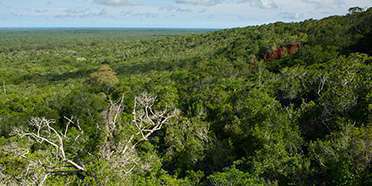- You are here:
- Home
- Countries & Parks
- Kenya Parks
- Arabuko Sokoke Forest Reserve
- Reviews
- Expert Reviews
Expert Reviews – Arabuko Sokoke FR

Stuart is a travel writer and author of numerous Lonely Planet guidebooks, including 'Kenya', 'Rwanda' and 'Tanzania'.
6 people found this review helpful.
Elephant Shrews and ghosts
You don’t come to Arabuko Sokoke expecting to see the Big Five, but this, one of the last, large tracts of typical coastal forest left on the Kenyan coastline, makes for a brilliant half-day trip from the nearby beach resorts of Malindi and Watamu. It’s home to many a species you won’t see elsewhere – none of which are more captivating than the golden-rumped elephant shrew which is quite easy to come by. Although the park may lack the big glamour animals most people come to Africa to see it does excel at birds, butterflies and other insects. Several endemic birds are found here including the Sokoke scops owl and anyone interested in birds will find Arabuko Sokoke very rewarding.
What I like about this park is being able to dump the safari jeep and get out and walk – sheer joy after days bumping about dirt tracks in the big national parks! There are also a couple of nearby attractions that together can fill a couple of days. On the edge of the park, and still within the forest is the spooky ‘lost’ city of Gede. It’s rumoured to be haunted and my first visit, many years ago and before I knew of its ghostly reputation, was at the end of a drizzly afternoon. There was nobody else around but as I walked down one dark forest path I experienced such a strong sensation of being watched that the hairs on the back of my head literally stood on end and I ran back to the main ticket booth! A lot less scary is the nearby Kipepeo butterfly farm, which supplies collectors in the west and makes for an interesting visit. Within the immediate vicinity of the park is Mida Creek with its raised boardwalk through the mangroves and excellent guides. And then there’s the beach itself at Watamu – a personal favourite.
So, while Arabuko-Sokoke might not have any lions its mix of family-friendly activities and ease of visiting make it a real highlight of coastal Kenya.

Philip is an acclaimed travel writer and author of many guidebooks, including the Bradt guides to Uganda, Tanzania, Kenya and South Africa.
4 people found this review helpful.
Home Of Kenya’s Largest ‘Lost City’
Protecting the largest remaining tract of coastal forest in Kenya, Arabuko-Sokoke is renowned as the home of several bird and mammal species that are either endemic or near-endemic to this one isolated forest. My favourite among these is the bizarre golden-rumped elephant shrew, which is often glimpsed bouncing along the forest paths like a twitchy nosed miniature kangaroo. For twitchers, the big attractions are Clarke’s weaver and the Sokoke scops owl (Africa’s smallest owl), neither of which I’ve seen, though they are reputedly easy enough to locate in the company of a specialist local guide. But in my view the single biggest attraction of this lush coastal forest is the Gedi Ruins, a jungle-clad ‘Lost City’ whose abandoned coral rag mosques and palaces form one of the most extensive surviving relicts of the series of Swahili city-states that traded along the East African Coast in mediaeval times.

Ariadne is a renowned African wildlife photographer whose work is featured in many well-known guidebooks and magazines.
4 people found this review helpful.
An Important Refuge for Endangered Wildlife
Arabuko Sokoke protects the largest remaining tract of coastal forest in Kenya. Although close to the popular holiday resorts of Malindi and Watamu, it isn’t a big tourist attraction. You won’t see lots of wildlife here, but it’s an important refuge for several near-endemic and highly endangered creatures such as the Aders’ duiker and the golden-rumped elephant shrew. The forest is also a birder’s hotspot offering a chance to see Africa’s smallest owl (Sokoke scops owl) among other sought-after specials.
You’ll need a specialized local guide to have a good chance of picking up these localized species, but even on a short stroll or drive you’ll be able to enjoy the bird chorus and fluttering butterflies. A squiz around the waterlily-filled ponds usually brings up some frogs as well.

Lizzie is a reputed guidebook writer and author of the Footprint guides to South Africa, Namibia, Kenya, Tanzania, Uganda and Zimbabwe.
3 people found this review helpful.
A pleasant forest ramble near the coast and excellent for bird-watching
Next to the coastal road between Kilifi and Watamu, Arabuko Sokoke is one of the largest patches of coastal forest left in Kenya. But don’t expect tropical rainforest – as you approach from the road the only discernable difference is that the coastal scrub thickens and the trees are higher. A number of trails lead through the forest, and the host of endemic and endangered flora and fauna are the main attraction. Some of the birds are rare or not found in other parts of Kenya; for example Fischer's turaco, sokoke pipit and amani sunbird, rare mammals include Ader's duiker and golden-rumped elephant-shrew, and there are numerous species of frogs and butterflies. Arabuko Sokoke can't compete with a wildlife safari but walking is easy, the knowledge of the guides that go with you make it much more interesting, and it’s a refreshing excursion from the sultry coastal resorts.


 Kenya Parks
Kenya Parks